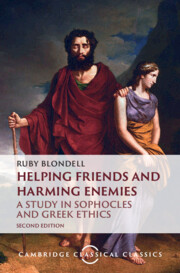7 - Oedipus at Colonus
Published online by Cambridge University Press: aN Invalid Date NaN
Summary
The twin principles Help Friends and Harm Enemies are fundamental to the structure of Oedipus at Colonus. At the outset Oedipus reveals Apollo’s prophecy which he wishes to fulfil, and whose fulfilment will constitute the action of the play. He is to find rest at Athens, ‘bringing profit by dwelling here to those who welcomed me, but doom to those who sent me away, driving me out’). The dual theme is restated more explicitly when he tells the chorus that if they help him they will gain ‘a great saviour for this city, and troubles for my enemies’. For the first 700 lines of the play, until Creon arrives, Oedipus’ two-edged hopes and emerging power to implement them are constantly stressed. He shows his benign aspect to the Athenians, to whom he promises soteria and benefits if they help him. The arrival of Ismene shows his love for his daughters, and through her message his power over Thebes is revealed. It gradually emerges how he intends to use that power, and the scene culminates in a curse on his sons and a prayer that he may indeed have the control over their fate which the oracle has promised him. Later, in his long speech to Theseus, it is made clear that the same event will simultaneously bring help to his friends and harm to his foes, and Theseus’ response shows a full understanding of this.
- Type
- Chapter
- Information
- Helping Friends and Harming EnemiesA Study in Sophocles and Greek Ethics, pp. 226 - 259Publisher: Cambridge University PressPrint publication year: 2024



